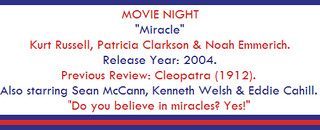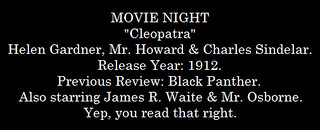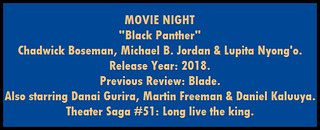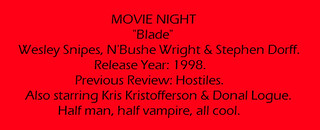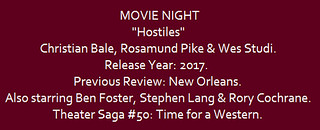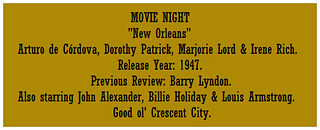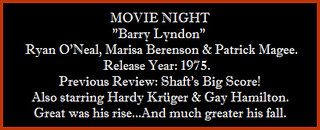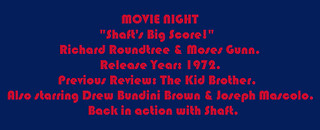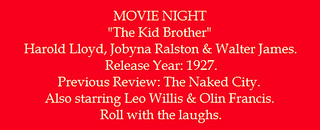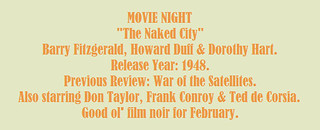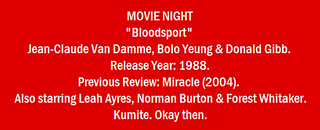
Review #1053: Bloodsport.
Cast:
Jean-Claude Van Damme (Frank Dux), Bolo Yeung (Chong Li), Donald Gibb (Ray Jackson), Leah Ayres (Janice Kent), Norman Burton (Helmer), Forest Whitaker (Rawlins), Ken Siu (Victor Lin), Roy Chiao (Senzo Tanaka), Michel Qissi (Suan Paredes), and Philip Chan (Inspector Chen) Directed by Newt Arnold.
Review:
This film was released 30 years ago on this day today. So why not do a review for it? That's my best justification for doing this movie. Hopefully you enjoy the review.
What can I say about this movie? What is there to write about a film starring "international martial arts sensation" Jean-Claude Van Damme that doesn't end in some sort of laughter or amazement that it exists (and naturally fitting for the 1980s)? The best thing to say is that at least it is a movie filled with some fair moments of action, although it is not accompanied by much in terms of story nor acting. This was the second feature role for Van Damme, who had appeared in No Retreat, No Surrender (1986) along with minor roles in other films (such as Breakin' in 1984), and while the easy thing to do would be to simply make fun of him for his performance (as one could do with the film), I will state that there is a certain level of intrigue that Van Damme inspires (for better or for worse) that keeps the movie from becoming a bore, mostly because he doesn't become a victim to the plot, as thin and preposterous as it gets. Gibb is enjoyably over-the-top, giving me a few chuckles (take that for what its worth). Yeung plays his adversary role with a fine polish that doesn't give him much dialogue but does manage to make him at least look the part of the big bad. Ayres does okay, although I can't say the romance subplot with her and Van Damme is anything too special. Burton and Whitaker prove to be an odd duo to pursue the main character that don't click too particularly well with the film, but at least they don't derail the movie. The rest of the cast isn't too noteworthy, but they do their parts reasonably fine.
When asked about the film (with relation to Frank Dux, whose exploits had been covered in the magazine Black Belt in 1980), co-writer Sheldon Lettich stated that he had known Dux months prior to thinking up the idea for the film, stating that he "told me a lot of tall tales, most of which turned out to be bullshit. But his stories about participating in this so-called "Kumite" event sounded like a great idea for a movie." It should be noted that Dux served as fighting coordinator for the film, putting Van Damme through a three month training program. I will state the action sequences (along with Van Damme's splits) are reasonably impressive at times, managing to have a good amount of spectacle that makes the movie seem worth it during its 92 minute run-time. Whether one puts much weight on Dux's "kumite experiences" is up to the viewer, but does it get in the way of enjoying the movie? No, partly because I doubt anyone watches the movie expecting this "true story" to be anything other than a tall tale that would likely make Paul Bunyan blush. Take this film for what it is: a ridiculous, but uninsulting piece of work that doesn't try to overextend itself beyond just attempting to be entertainment. Do I like it? No, but I can see why someone else would.
Overall, I give it 6 out of 10 stars.

